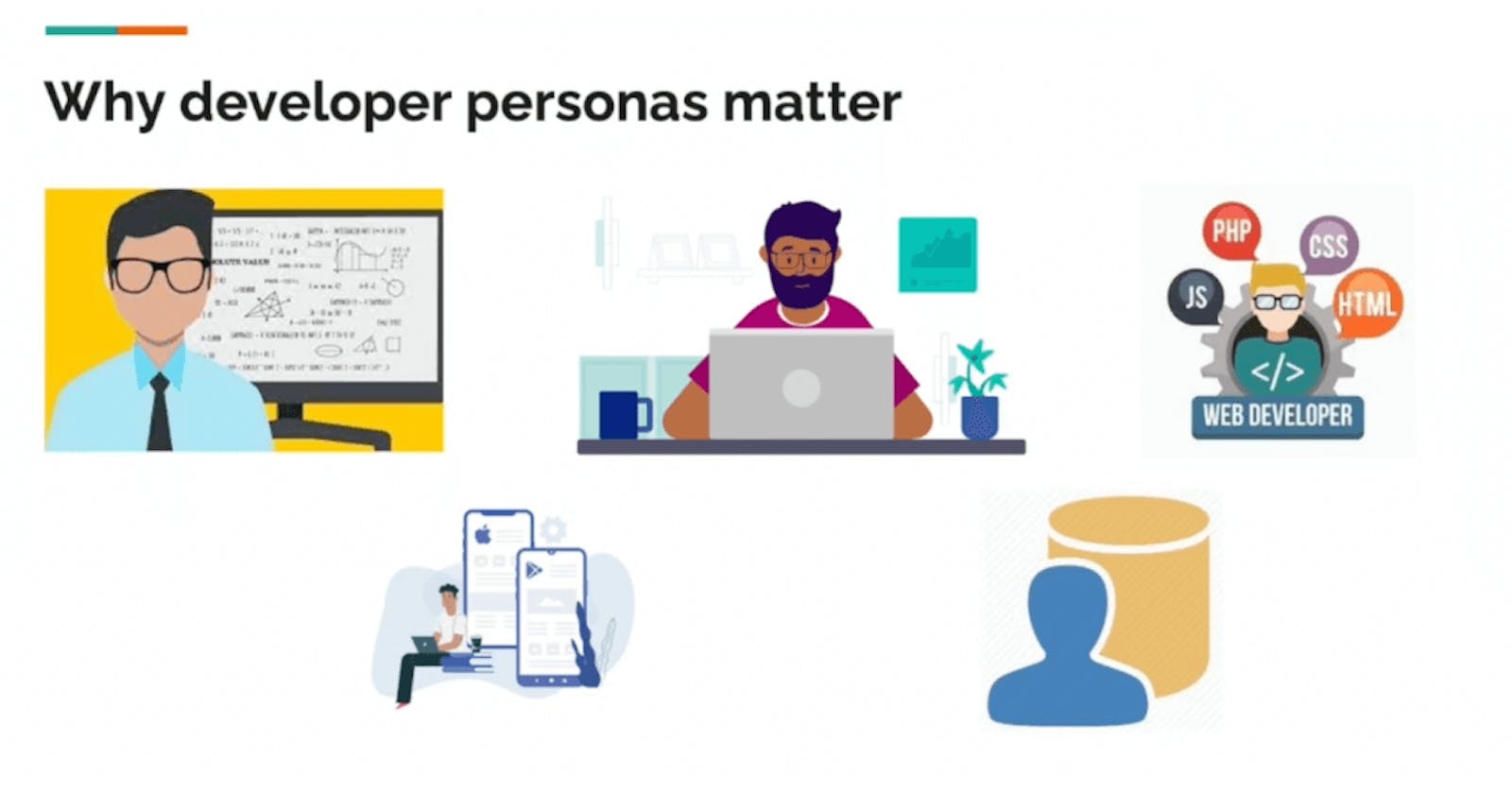What are developer personas and why do they matter?
Why do we need to learn about developer personas?
Table of contents
- Introduction
- Empowering Innovation: Unraveling the Enigma of Developer Personas
- What Are Developer Personas?
- The Art of Building Developer Personas
- The Developer Experience and Empathy-Driven Design
- Fueling Innovation and Collaboration
- The Role of Developer Personas in Talent Acquisition
- Challenges and Pitfalls
- Conclusion
Hello and welcome! 🤩🤩🤩
Welcome to today's article. Today we will be discussing Developer personas and why they matter.
Introduction
Developing personas for developers can be a valuable tool for comprehending the requirements and experiences of various types of developers. By familiarizing ourselves with their skills and emotions, we can create tools that are more user-friendly and help them operate more efficiently. This will ensure that everyone is working together to produce better technology for everyone. It's important to acknowledge the hard work done by developers, and by employing personas to gain insight into their viewpoints, we can guarantee that they feel appreciated and supported in their profession.
Empowering Innovation: Unraveling the Enigma of Developer Personas
In the dynamic and ever-evolving world of technology, developers play a pivotal role in shaping the digital landscape. They are the architects who transform ideas into functioning software, applications, and platforms that drive businesses and societies forward. However, despite their indispensable role, developers are often underappreciated and misunderstood. This neglect has led to a lack of insight into the diverse minds of coders, hindering the full potential of innovation in the tech industry. To unlock this potential, we must explore the power of developer personas, a valuable tool that bridges the gap between developers and the broader ecosystem, empowering them to achieve their best.
What Are Developer Personas?
In essence, developer personas are fictional representations of distinct segments within the developer community. These personas are built on extensive research, data analysis, and insights from actual developers. They encompass various aspects, such as technical expertise, coding preferences, motivations, and pain points. By creating a comprehensive and accurate representation of developers, businesses and development teams can gain deeper insights into the minds of coders, enabling more effective decision-making and collaboration.
The Art of Building Developer Personas
Developing meaningful and impactful developer personas requires a meticulous approach to research. The first step involves engaging directly with the developer community through interviews, surveys, and observations. These interactions help uncover the challenges they face, their professional aspirations, and their preferred working styles. By blending quantitative data, such as demographics and skillsets, with qualitative data, like emotions and preferences, we create a multifaceted view of developers' personas.
Moreover, developer personas should not be rigid or one-size-fits-all. The tech industry thrives on diversity, and so should the personas. Each persona should represent a unique segment of the developer community, ranging from junior developers seeking mentorship to seasoned architects driving innovation. Embracing diversity in personas fosters an inclusive environment where every developer's needs are addressed and valued.
The Developer Experience and Empathy-Driven Design
Understanding developer personas can have a transformative impact on the developer experience (DX). DX encompasses the overall experience and satisfaction that developers derive from their tools, platforms, and workplaces. By gaining insights into developers' preferences and pain points, businesses can design better, more intuitive tools that align with developers' workflows. This empathetic approach significantly enhances productivity and efficiency, allowing developers to focus on their core expertise rather than grappling with cumbersome tools.
Furthermore, the value of empathy-driven design extends beyond productivity. When developers feel that their needs and perspectives are understood and valued, it fosters a sense of appreciation and belonging within the organization. This leads to improved job satisfaction, increased motivation, and reduced turnover rates, contributing to a more stable and resilient workforce.
Fueling Innovation and Collaboration
Innovation thrives when diverse minds collaborate effectively. Developer personas act as a bridge that facilitates communication and collaboration between various stakeholders, such as developers, designers, product managers, and executives. By humanizing developers and understanding their unique viewpoints, businesses can establish a common ground for decision-making.
In practice, this translates into fewer misunderstandings and conflicts arising from differences in goals or priorities. A shared understanding of developer personas helps align business objectives with developers' aspirations, leading to more focused and successful product development.
The Role of Developer Personas in Talent Acquisition
Attracting and retaining top talent is a constant challenge in the tech industry. Developer personas can play a crucial role in streamlining talent acquisition strategies. By tailoring job listings, recruiting efforts, and onboarding experiences to cater to the specific needs and preferences of developers, businesses can attract candidates who are an ideal fit for their organizational culture and goals.
Additionally, understanding developer personas allows companies to identify and nurture potential talent within their existing teams. By recognizing the aspirations of individual developers, businesses can provide tailored training and mentorship opportunities, leading to more well-rounded and skilled professionals.
Challenges and Pitfalls
While developer personas hold immense promise, there are potential challenges and pitfalls to consider. One risk is relying too heavily on generalizations and stereotypes, which can lead to misinterpretations and alienation of certain developer segments. It is crucial to view personas as dynamic and continuously evolving representations that adapt to changing trends and individual growth.
Conclusion
In summary, the power of developer personas lies in their ability to illuminate the path to innovation in the tech industry. By understanding developers on a deeper level, businesses can create more empathetic and inclusive environments, fuel collaboration, and attract top talent. Developer personas not only empower developers to do their best work but also pave the way for groundbreaking advancements that shape the digital world of tomorrow. Embracing this invaluable tool is not just a choice; it is imperative for those seeking to lead the charge in the age of technology.
This article was meant to be part of the #2Articles1Week challenge, but I forgot to add it in. Just doing so now.
